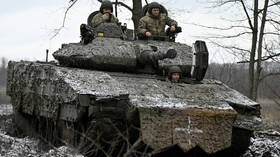Ukrainian counteroffensive was ‘quite successful’ – top official

Ukraine's counteroffensive against Russian forces, launched early last summer, was “quite successful,” the Head of the Office of the President of Ukraine, Andrey Yermak, has claimed.
President Vladimir Zelensky's top aide made the remarks in an interview with the Spanish newspaper El Mundo, published on Friday. Yermak dismissed all suggestions that the operation had outright failed or stalled as "Russian propaganda." However, he admitted that hopes for the push had been set too high
“I agree that expectations have to meet capabilities. And, taking into account the capabilities provided," the official explained, apparently referring to West-provided weapons, "the counteroffensive was quite successful,” he concluded, implying that Western aid had proven way too limited for the counteroffensive to yield better results.
Yermak’s assessment of the outcome of Kiev's fight-back has evoked an ironic reaction in Moscow, with Foreign Ministry spokeswoman Maria Zakharova suggesting that he'd apparently failed to mention one crucial detail.
“He forgot to mention [Ukraine’s counteroffensive was successful] ‘for Russia,’” Zakharova wrote in a Telegram post.
According to the latest Russian estimates provided by Defense Minister Sergey Shoigu earlier this month, Ukraine lost more than 215,000 troops and 28,000 pieces of military hardware last year alone. He put the total tally nearing 400,000. According to these estimates, more than half of the casualties were sustained by the Ukrainian military during its counteroffensive push, which Moscow has repeatedly described as a failure.
Kiev has never officially disclosed the country’s casualty figures sustained amid the conflict with Russia. The heavy losses have been indirectly corroborated by Kiev’s ever-widening mobilization effort, which has grown increasingly lawless and violent during the hostilities.
Late last year, Zelensky claimed the country’s military had asked him to round up another 450,000 to 500,000 recruits to bolster the ranks. The announcement was made shortly before a new mobilization bill was brought before the Ukrainian parliament. It proposed lowering the draft age from 27 to 25, eliminating exemptions for some categories of disabled people, and introducing other measures to expand the pool of eligible service personnel.
Ukrainian MPs, however, failed to agree on it, and the legislation ended up being shelved.













